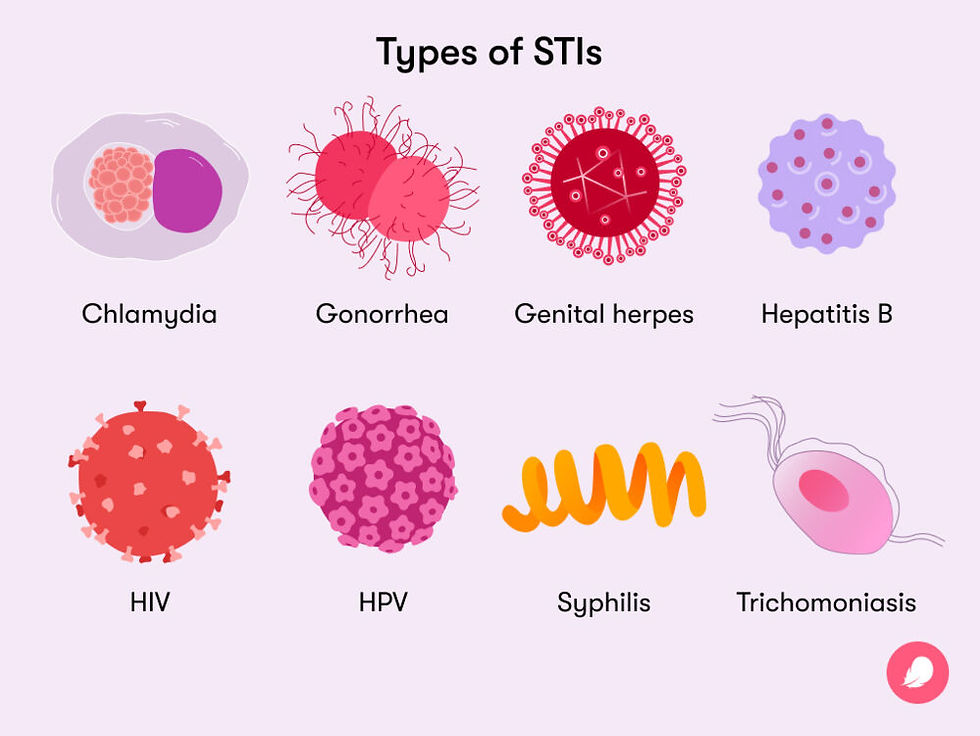How to Prevent STIs: 7 Tips and Strategies for Staying Safe
- Byon8 Team
- May 5, 2023
- 2 min read
Updated: Aug 15, 2023
Sexually transmitted infections (STIs) are a serious health concern that can have lifelong consequences if left untreated.

There are many types of STIs, including:
Chlamydia: A bacterial infection that can cause pain during urination, vaginal discharge, and abdominal pain.
Gonorrhea: A bacterial infection that can cause similar symptoms to chlamydia, as well as fever and sore throat.
Syphilis: A bacterial infection that can cause a rash, fever, and sore throat in its early stages, and can lead to serious complications if left untreated.
Human papillomavirus (HPV): A viral infection that can cause genital warts and an increased risk of certain types of cancer.
Herpes: A viral infection that can cause painful blisters or sores on the mouth or genitals.
Human immunodeficiency virus (HIV): A viral infection that attacks the immune system and can lead to acquired immunodeficiency syndrome (AIDS).
Hepatitis B and C: Viral infections that can cause liver damage and increase the risk of liver cancer.
Trichomoniasis: A parasitic infection that can cause vaginal itching, discharge, and odour.
Ways to prevent yourself from getting infected:
Fortunately, there are several ways to prevent STIs, and by taking the right precautions, you can significantly reduce your risk of contracting one.
Get that condom
One of the most effective ways to prevent STIs is to use condoms every time you have sex. Condoms create a barrier that can prevent the transmission of STIs from one person to another. Make sure to use a new condom every time you have sex, and use it correctly.
Get tested regularly
It's important to get tested for STIs regularly, especially if you're sexually active. STIs can be asymptomatic, meaning you may not know you have an infection. By getting tested regularly, you can catch an STI early and get treatment.
"STIs don't discriminate based on age, gender, or sexual orientation. Anyone who is sexually active is at risk." - Dr. Karen Boyle
Limit your sexual partners
The more sexual partners you have, the greater your risk of contracting an STI. Try to limit your number of sexual partners and choose partners who have been tested and are free of STIs.
Communicate with your partner
Communication is key when it comes to preventing STIs. Talk to your partner about your sexual history and ask about theirs. Discuss ways to protect yourselves and make sure you're both on the same page.
Avoid high-risk behaviours
Certain sexual behaviours, such as unprotected anal sex or sharing sex toys, can increase your risk of contracting an STI. Avoid these high-risk behaviours and opt for safer alternatives.
Practice good hygiene
Practising good hygiene can also help prevent STIs. Make sure to wash your hands and genitals before and after sex. Avoid sharing towels or clothing with others, as this can spread STIs.
Get vaccinated
Some STIs, such as HPV, can be prevented with a vaccine. Talk to your healthcare provider about getting vaccinated against STIs.
In conclusion, preventing STIs requires taking a proactive approach to your sexual health. By using condoms, getting tested regularly, limiting sexual partners, communicating with your partner, avoiding high-risk behaviours, practising good hygiene, and getting vaccinated, you can significantly reduce your risk of contracting an STI. Remember, prevention is key, so take the necessary steps to protect yourself and your partner.
It's important to note that some STIs may not have any symptoms, which is why regular testing is crucial for detecting and treating infections.



Comments